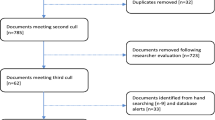Abstract
This study evaluated the effectiveness of an intensive three-week science institute for preservice and inservice elementary teachers that was funded by an Eisenhower Professional Development grant and a Regents’ Initiative Research grant. The institute was held in combination with a summer science camp for elementary children. Pre-and post-assessments indicated an increased level of comfort with inquiry-based teaching, as well as an increase in content and pedagogical knowledge. On an open-ended questionnaire, the teachers indicated that the opportunity for immediate application of their own learning with children in the camp was a valuable part of the program.
Similar content being viewed by others
References
Baird, W., Ellis, J., & Kuerbis, P. (1989). ENLIST micros: Training science teachers to use microcomputers.Journal of Research in Science Teaching, 26, 587–598.
BEll, G. L. (2001, March 26).Reflective journal writing in an inquiry-based science course for elementary pre-service teachers. Paper presented at the annual international conference of the National Association for Research in Science Teaching, St. Louis.
Chambers, D. P., & Stacey, K. (1999, February/March). Authentic tasks for authentic learning: Modes of interactivity in multimedia for undergraduate teacher education. InSITE 99: Society for Information Technology & Technology Teacher Education International Conference (10th annual conference) San Antonio, TX.
Greenwood, A., & Haury, D. (1995). Putting the science back into science education through the science education program and leadership (SEPAL) model.Journal of Science Teacher Education, 6(3), 153–157.
Klein, B. S. (2001). Guidelines for effective elementary science teacher inservice education.Journal of Elementary Science Education, 13(2), 29–40.
Loucks-Horsley, S., Hewson, P. W., Love, N. & Stiles, K. E. (1998).Designing professional development for teachers of science and mathematics. Thousand Oaks, CA: Corwin Press.
Lumpe, A. T., Haney, J. J., & Czerniak, C. M. (2000). Assessing teachers’ beliefs about their science teaching context.Journal of Research in Science Teaching, 37(3), 275–292.
National Research Council (NRC). (1996).National science education standards. Washington, DC: National Academy Press.
Riggs, I. M., & Enochs, L. G. (1990). Toward the development of an elementary teacher’s science teaching efficacy belief instrument.Science Education, 74(6), 625–637.
Stiegelbauer, S. M. (1994). Change has changed: Implications for implementation of assessment from the organizational change literature. InSystemic reform: Perspectives on personalizing education. Available online: 〈http://inet.ed.gov/pubs/EdReformStudies/SysReforms/stiegel1.html〉.
Stiegelbauer, S. M. (1994). Change has changed: Implications for implementation of assessment from the organizational change literature. InSystemic reform. Perspectives on personalizing education. Available online: 〈www.ed.gov/pubs/EdReformStudies/SysReforms/stiegel1.html〉. Downloaded: September 5, 2003.
Swafford, J. O., Jones, G. A., Thornton, C. A., Stump, S. L., & Miller, D. R. (1999) The impact on instructional practice of a teacher change model.Journal of Research and Development in Education, 32(2), 69–82.
Author information
Authors and Affiliations
Corresponding author
Rights and permissions
About this article
Cite this article
Naizer, G., Bell, G.L., West, K. et al. Inquiry science professional development combined with a science summer camp for immediate application. J Elem Sci Edu 15, 31–37 (2003). https://doi.org/10.1007/BF03173841
Accepted:
Issue Date:
DOI: https://doi.org/10.1007/BF03173841




